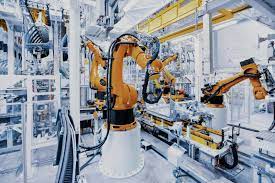
Certainly! Here’s an overview of Automation and Robotics Engineering, including key aspects and a syllabus typically followed in India:
Key Aspects:
- Automation Systems: Understanding the principles and applications of automation systems, including PLCs (Programmable Logic Controllers), SCADA (Supervisory Control and Data Acquisition), DCS (Distributed Control Systems), and industrial automation software.
- Robotics: Study of robotic systems, including robot kinematics, dynamics, control systems, sensors, actuators, and programming languages used in robotics such as C++, Python, and MATLAB.
- Mechatronics: Integration of mechanical, electrical, and computer engineering principles in designing and controlling electromechanical systems, including mechatronic systems used in automation and robotics.
- Control Systems: Analysis and design of control systems used in automation and robotics, including feedback control, PID controllers, digital control systems, and optimal control techniques.
- Sensors and Actuators: Understanding various sensors and actuators used in automation and robotics, such as proximity sensors, encoders, motors, pneumatic actuators, and hydraulic actuators.
- Industrial Automation: Application of automation technologies in industrial settings, including automated manufacturing processes, robotic assembly lines, material handling systems, and quality control systems.
- Robotics Applications: Exploration of robotics applications in diverse fields such as manufacturing, healthcare, agriculture, logistics, space exploration, and entertainment.
- Artificial Intelligence and Machine Learning: Integration of AI (Artificial Intelligence) and machine learning techniques in robotics for tasks such as object recognition, path planning, motion control, and decision making.
- Human-Robot Interaction: Study of human-robot interaction principles, including user interface design, safety considerations, collaborative robotics, and social robotics.
- Ethical and Societal Implications: Consideration of ethical, legal, and societal implications of automation and robotics technologies, including job displacement, privacy concerns, and ethical use of autonomous systems.
Syllabus (Typically Followed in India):
- Engineering Mathematics:
- Calculus
- Differential Equations
- Linear Algebra
- Probability and Statistics
- Basic Sciences:
- Physics
- Chemistry
- Engineering Mechanics
- Thermodynamics
- Basic Electrical and Electronics Engineering:
- Electrical Circuits and Networks
- Electronic Devices and Circuits
- Digital Electronics
- Signals and Systems
- Control Systems Engineering:
- Control Systems Analysis and Design
- Feedback Control Systems
- PID Controllers
- Digital Control Systems
- Mechatronics:
- Sensors and Actuators
- Microcontrollers and Embedded Systems
- Mechatronics Systems Design
- Robotics Fundamentals
- Industrial Automation:
- PLC Programming and Applications
- SCADA Systems
- DCS (Distributed Control Systems)
- Industrial Robotics
- Robotics:
- Robot Kinematics and Dynamics
- Robot Control Systems
- Robotic Sensors and Actuators
- Robot Programming and Applications
- Artificial Intelligence and Machine Learning:
- Introduction to AI and Machine Learning
- AI Techniques for Robotics
- Machine Learning for Robotics
- Robotics Applications of AI
- Human-Robot Interaction:
- Human Factors in Robotics
- User Interface Design for Robots
- Safety in Human-Robot Interaction
- Social Robotics
- Robotics Applications:
- Robotics in Manufacturing
- Robotics in Healthcare
- Robotics in Agriculture
- Robotics in Space Exploration
- Project Work and Industrial Training:
- Students typically undertake a project related to automation or robotics in their final year, where they apply their knowledge and skills to solve a real-world problem or develop a robotic system. They may also undergo industrial training or internships to gain practical experience in automation and robotics technologies.
This syllabus equips students with the necessary theoretical knowledge and practical skills to pursue careers in automation, robotics, mechatronics, and related fields in industries such as manufacturing, healthcare, automotive, aerospace, and logistics. It also provides a solid foundation for higher studies or research in specialized areas within Automation and Robotics Engineering.
